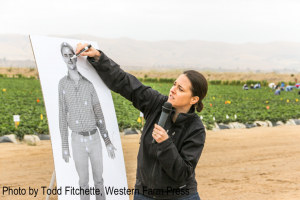By: Sarah Risorto and Lisa Blecker, UC IPM Pesticide Safety Education Program
We are in the midst of a new and changing era of Worker Protection Standards (WPS). The U.S. Environmental Protection Agency (EPA) and the California Department of Pesticide Regulation (DPR) recently published the revised WPS, which is meant to increase protections for agricultural fieldworkers and pesticide handlers from pesticide exposure when they’re working in farms, forests, nurseries and greenhouses. The changes are already affecting California agriculture!
What major regulatory changes have already gone into effect?
Several changes are required to have been in place as of January 2, 2017. These include:
- All 417,000 fieldworkers in California must attend annual pesticide safety training.
- Records of all fieldworker pesticide safety trainings must be kept on file for 2 years.
- Fields must be posted when the restricted entry interval (REI) exceeds 48 hours.
- “Application-exclusion zones” must be implemented to prevent the entry of anyone into areas up to 100 feet from pesticide application equipment.
- Instructors previously qualified via a DPR-approved Instructor Training programs (Train the Trainer) are qualified to train through 2017. If you wish to be qualified to train fieldworkers and handlers after December 31, 2017 using this qualification, you must complete an updated, DPR-approved Train the Trainer workshop.
Now is the time to make sure these changes are put in place!
What major regulatory changes are still in store for us? When will they happen?
The regulatory changes that must be in place by January 2, 2018 include:
- Additional training topics for fieldworkers and handlers have to be added to the curriculum.
- Handlers have to suspend an application if anyone enters the application exclusion zone.
Who do these changes affect?
Many people who work in the California agricultural community will be impacted by the WPS revisions. These include fieldworkers, pesticide handlers, farm labor contractors, private and in-house safety trainers, growers, farm managers, licensed pesticide applicators (private and commercial), pest control advisors (PCAs), and crop consultants, to name a few.
How do I know if I am qualified to train?
If you attended one of the DPR-approved Train-the-Trainer programs you are qualified through 2017. However, if you wish to continue training after the end of the year, you must complete a DPR-approved Instructor Training Program, which includes the 2018 training topic requirements. If you maintain certain licenses/government designations, including PAC, QAC, QAL, PCA, and certain County Biologist licenses you are qualified to train. UCCE Advisors are also qualified to train.
How can I get qualified as a trainer?
To become a trainer, take an Instructor Training program that is approved by DPR for 2018 topics. The University of California Pesticide Safety Education Program (part of the UC Statewide Integrated Pest Management Program, UC IPM), in partnership with AgSafe, will offer multiple workshops this spring that cover the new federal requirements for fieldworker and handler training. Courses are offered in both English and Spanish. You can reserve your spot now. At the end of the training you will be a certified pesticide safety instructor.

Lisa Blecker, UC Statewide IPM Program, leads a training course. Photo credit: Todd Fitchette, Western Farm Press.
If I am currently qualified, how can I make sure I stay up to date on all the new requirements?
If you are currently qualified as a trainer because you maintain a California PAC, QAC, or QAL, or if you are a PCA, you can attend an Instructor Training Program this spring to learn about the new WPS requirements and additional training topics. While a certification may qualify you, an Instructor Training Program will prepare you to train! Register today!


Leave a Reply